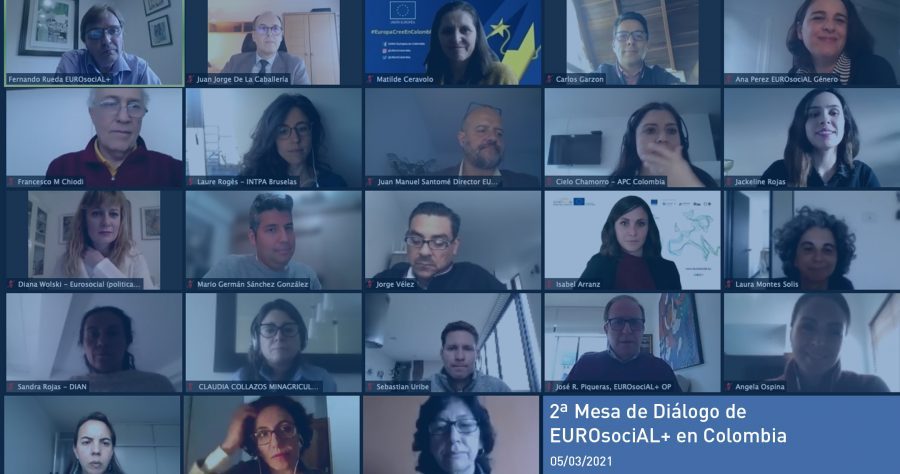High-level Colombian and European Union authorities, through their programme for social cohesion and the reduction of inequalities, EUROsociAL+, have approved a roadmap with the actions the Programme will implement together with national institutions and under the coordination of the Ministry of Foreign Affairs, the National Planning Department and the Presidential Agency for International Cooperation (APC Colombia).

The EUROsociAL+ cooperation model is based on the principle of demand and on permanent dialogue on public policies through the exchange of expertise and public knowledge between the European Union and Latin America. The process to define which actions EurosociAL will implement in each country culminates in the “Dialogue Round Tables”, which are spaces for inter-agency coordination to prioritise the demands of the Latin American countries and improve the coherence, impact and sustainability of the public policies the programme supports.
In the 2nd Dialogue Round Table to be organised by EUROsociAL+ in Colombia, which was held on 5 March 2021, authorities from 15 institutions in the country participated to approve the roadmap with a portfolio of around 30 actions, some of which have been ongoing since 2019 along with others that respond to new needs, which will be implemented during 2021.
The Director of EUROsociAL+, Juan Manuel Santomé, highlighted that the roadmap “crystallises an effort of dialogue and prioritisation that, we are sure, will lead to reforms and significant results that will contribute to addressing an inclusive post-COVID recovery that lays the foundations for a process development that leaves no one behind, as postulated by the 2030 Agenda”.
Patricia Llombart, the Ambassador for the European Union in Colombia, highlighted that “in a process to rebuild the social and economic fabric broken by the pandemic, programmes such as EUROsociAL+ are key for Colombia and Europe to jointly design innovative mechanisms to build back better”.
The Round Table discussed the general panorama for the main cooperation processes between the European Union and Latin America in the context of the pandemic and the keys to articulating policies “so that no one is left behind” post-COVID-19. Policy priorities for reactivation, repowering and for sustainable and inclusive growth were presented: a new commitment to the future of Colombia.
The portfolio of approved actions is aligned with the Post-COVID-19 Strategy from the Government of Colombia, with its National Strategy for International Cooperation (ENCI 2019-2022) and with the goals set out in the National Development Plan and in the 2030 Agenda for Sustainable Development.
Olga Romero, the Director of Public Policy Monitoring and Evaluation with the National Planning Department (DNP), explained that “each Pact in the National Development Plan 2018-2022 defines a series of monitoring indicators that were, one by one, aligned with the 169 SDG targets, seeking to determine possible associations between both planning instruments. As a result, of the 663 indicators agreed to date for monitoring the 2018-2022 PND, 98.2% are associated with one or more SDG targets”.
DNP Sectoral Deputy Director General Daniel Gómez, added that “the CONPES reactivation document proposes actions to strengthen the capacities of households to face crisis situations while seeking to promote social mobility. In particular, it includes lines of action to better target the social programmes and mitigate the risk of a greater incidence of poverty and vulnerability in rural areas, with which it is expected to recover and enhance the cohesion of Colombian society”.
Special mention should be made of the roadmap projects linked to the post-COVID-19 recovery, such as the implementation of employment programmes for the people most affected by the pandemic, or the strengthening of the Family Police Stations to deal with violence in a COVID-19 context. Special attention was also paid, among others, to migration issues, in particular treatment at borders with Venezuela, and the control of fraud and tax evasion through new information technologies.
The session ended with the words of Karen Mendoza, Director of Demand Management with APC-Colombia, who highlighted “the horizontal, coordinated and transparent work that we have undertaken with the European Union, in forming a work team, which more than being a coordination team is a dialogue team, from which it has been possible to prioritise the actions that will mark this year’s roadmap for 2021 with the EUROsociAL programme, which respond to and are integrated into our National Development Plan, Pact for Colombia, a pact for equity and that of course are in line with the National Strategy for International Cooperation (ENCI)”.
The dialogue between the Colombian institutions and the EUROsociAL+ Programme’s Democratic Governance, Gender Equality and Social Policies areas will continue after this second “Colombia Round Table” to define in more detail the budget, the accompanying itinerary and the expected results.
Related content
2nd EUROsociAL+ Dialogue Round Table in Colombia: recording of the session, presentations, agenda and concept note.
EUROsociAL+ / Colombia roadmap 2021



